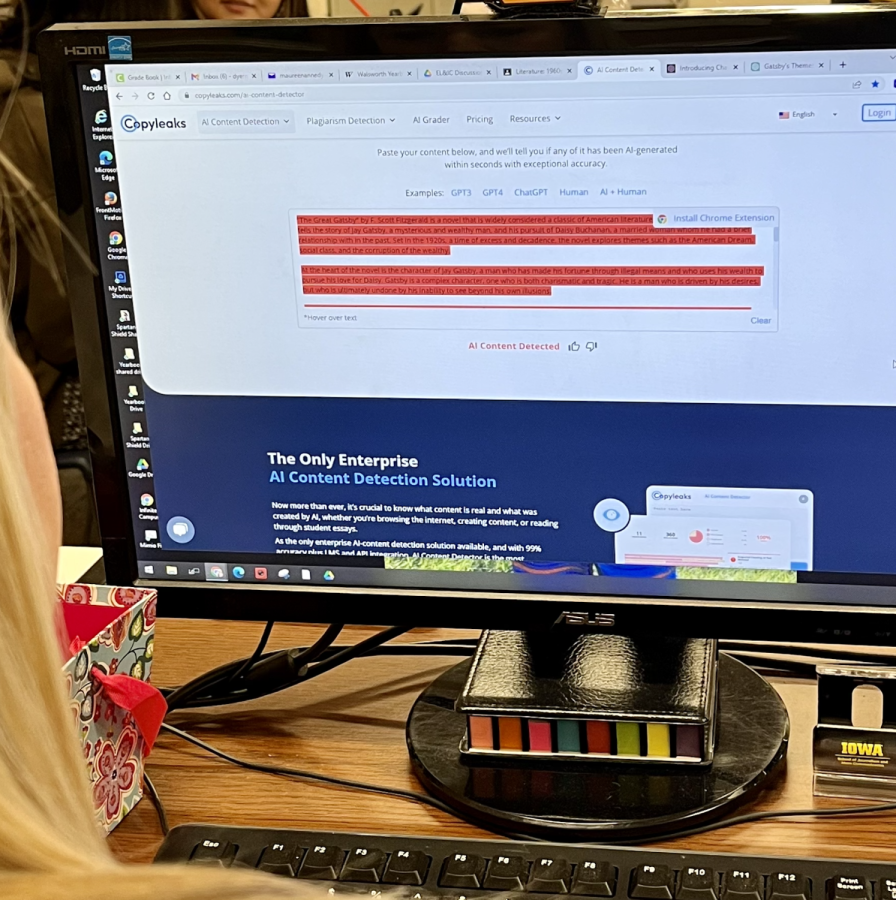As technology becomes more advanced and accessible to students in the classroom, the ability to cheat in the form of plagiarism has become much easier – especially since the release of the new AI tool ChatGPT.
Since its release on November 30, 2022, ChatGPT has continued to adapt and fit more seamlessly into the lives of students. With frequent advertisements on social media, the ChatGPT marketing is targeted towards young audiences.
PV librarian Carissa McDonald has seen the effects of the new technology as it enters classrooms. “There definitely was an uptick at the end of last semester with teachers noticing things that weren’t quite right,” said McDonald.
As ChatGPT grows in popularity, it is reaching younger audiences who aren’t using it as a tool for learning, but instead, as a tool to cheat themselves and others for a shortcut to a good grade.
ChatGPT works with an extremely sophisticated AI program created by OpenAI. When users give the program a prompt, the system finds material from sources all over the internet, organizes the gathered information and regurgitates an answer to the given prompt within a few seconds. Sometimes quotes are provided, but sources used are typically not listed.
By not having access to the original sources of this material, students using ChatGPT are plagiarizing and taking credit for the intellectual work done by other people.
Lynn Lundberg, an AP language teacher at PV, has shifted to in-class paper essays since the release of ChatGPT. “Checking for plagiarism takes up way more of a teacher’s time than it should. My job should be to help students learn, not to police student behavior,” said Lundberg. “The point of assigning essays isn’t so that I have this beautiful essay that’s going to teach me something. The point is using your own mind to generate and play around with ideas on paper.”
By assigning hand-written in-class essays, Lundberg can be confident that her students’ essays are a reflection of their growth and understanding. When students submit plagiarized work, they bypass the opportunity to practice and grow that allows them to further explore their learning.
Cheating has always been around and is often a result of students who procrastinate until the last minute trying to find an easier way out. “When ChatGPT initially came out, a lot of people were using it,” said McDonald. “It’s just so simple to do and takes very little effort.”
McDonald believes that when students cheat, it’s unfair to the source they are plagiarizing from, but it’s even more unfair to the students themselves. By taking this shortcut, these students are creating habits that will become increasingly more problematic as they move into higher education and careers.
Although most students know cheating is wrong, they feel intense pressure to obtain a specific grade and do whatever it takes to reach incredibly high academic expectations. This excuse, however, misinterprets a school’s goal to educate students. “It would be a sad world if the whole point of school were a grade,” said Lundberg. The goal of school is for teachers to teach and for students to learn. Grades are a tool that helps encourage these students to spend time learning.
The ways by which students show their growth are through assignments such as essays, worksheets and tests. By using other people’s work, the goal to educate students and teach them to explore their thinking is lost. Because of programs like ChatGPT, students are not taking advantage of their opportunities to think critically and grow academically.
With any form of technology comes limitations. Lacking emotional intelligence, human-level common sense and full-context understanding, ChatGPT will never equate to the nuanced ideas of the human mind. The unique voice and style of a student can not be replicated by computer programs. The AI program can pull different ideas together from various sources, but coming up with new perspectives is a quality this program lacks.
Teachers should be able to teach the material, assign work and be rest assured that the work done by their students is a product of that student’s learning. Utilizing ChatGPT damages the trust between educators and students, resulting in teachers being forced to put extra efforts in place to ensure students are submitting their own intellectual work.
Academic dishonesty creates a burden between educators and their students. With technology making it easier to cheat than ever before, the purpose of school has seemingly shifted to doing whatever it takes for a good grade rather than spending time indulging in the learning process.









